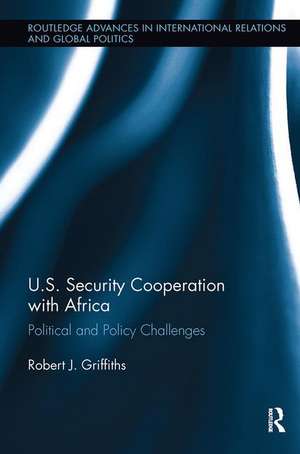U.S. Security Cooperation with Africa: Political and Policy Challenges: Routledge Advances in International Relations and Global Politics
Autor Robert J. Griffithsen Limba Engleză Paperback – 24 ian 2018
In this examination of the context of U.S.-African security relations, Robert J. Griffiths outlines the nature of the African state, traces the contours of African conflict, surveys the post-independence history of U.S. involvement on the continent, and discusses policy organization and implementation and the impact of U.S. experiences in Iraq and Afghanistan on the U.S.-Africa security relationship. Africa’s continuing geostrategic significance, the influence of China and other emerging markets in the region, and America’s other global engagements, especially in light of U.S. fiscal realities, demonstrate the complexity of U.S.-African security cooperation.
| Toate formatele și edițiile | Preț | Express |
|---|---|---|
| Paperback (1) | 482.53 lei 6-8 săpt. | |
| Taylor & Francis – 24 ian 2018 | 482.53 lei 6-8 săpt. | |
| Hardback (1) | 1109.04 lei 6-8 săpt. | |
| Taylor & Francis – 8 apr 2016 | 1109.04 lei 6-8 săpt. |
Din seria Routledge Advances in International Relations and Global Politics
-
 Preț: 383.48 lei
Preț: 383.48 lei -
 Preț: 310.55 lei
Preț: 310.55 lei -
 Preț: 188.83 lei
Preț: 188.83 lei -
 Preț: 152.86 lei
Preț: 152.86 lei -
 Preț: 311.59 lei
Preț: 311.59 lei - 9%
 Preț: 1003.12 lei
Preț: 1003.12 lei -
 Preț: 317.91 lei
Preț: 317.91 lei - 8%
 Preț: 390.08 lei
Preț: 390.08 lei -
 Preț: 377.82 lei
Preț: 377.82 lei -
 Preț: 303.47 lei
Preț: 303.47 lei - 18%
 Preț: 1170.74 lei
Preț: 1170.74 lei - 18%
 Preț: 1051.55 lei
Preț: 1051.55 lei - 18%
 Preț: 1220.46 lei
Preț: 1220.46 lei - 28%
 Preț: 850.99 lei
Preț: 850.99 lei - 18%
 Preț: 1056.32 lei
Preț: 1056.32 lei - 18%
 Preț: 1053.57 lei
Preț: 1053.57 lei - 18%
 Preț: 1057.89 lei
Preț: 1057.89 lei - 18%
 Preț: 1056.32 lei
Preț: 1056.32 lei - 18%
 Preț: 1066.09 lei
Preț: 1066.09 lei - 18%
 Preț: 1062.26 lei
Preț: 1062.26 lei - 18%
 Preț: 1056.32 lei
Preț: 1056.32 lei - 15%
 Preț: 449.41 lei
Preț: 449.41 lei - 25%
 Preț: 300.01 lei
Preț: 300.01 lei - 18%
 Preț: 1167.36 lei
Preț: 1167.36 lei - 28%
 Preț: 820.56 lei
Preț: 820.56 lei - 18%
 Preț: 1060.87 lei
Preț: 1060.87 lei - 18%
 Preț: 1270.98 lei
Preț: 1270.98 lei - 18%
 Preț: 1167.71 lei
Preț: 1167.71 lei - 18%
 Preț: 1112.21 lei
Preț: 1112.21 lei - 18%
 Preț: 997.11 lei
Preț: 997.11 lei -
 Preț: 427.12 lei
Preț: 427.12 lei - 18%
 Preț: 1057.40 lei
Preț: 1057.40 lei -
 Preț: 355.58 lei
Preț: 355.58 lei - 18%
 Preț: 1057.75 lei
Preț: 1057.75 lei - 18%
 Preț: 1115.33 lei
Preț: 1115.33 lei - 18%
 Preț: 1052.89 lei
Preț: 1052.89 lei - 26%
 Preț: 850.37 lei
Preț: 850.37 lei -
 Preț: 389.38 lei
Preț: 389.38 lei - 18%
 Preț: 1120.55 lei
Preț: 1120.55 lei - 18%
 Preț: 1059.93 lei
Preț: 1059.93 lei - 18%
 Preț: 1059.84 lei
Preț: 1059.84 lei - 18%
 Preț: 951.96 lei
Preț: 951.96 lei - 18%
 Preț: 1058.79 lei
Preț: 1058.79 lei - 18%
 Preț: 1061.81 lei
Preț: 1061.81 lei - 48%
 Preț: 572.55 lei
Preț: 572.55 lei - 18%
 Preț: 1059.84 lei
Preț: 1059.84 lei - 18%
 Preț: 1000.27 lei
Preț: 1000.27 lei - 18%
 Preț: 1056.28 lei
Preț: 1056.28 lei - 18%
 Preț: 1057.75 lei
Preț: 1057.75 lei
Preț: 482.53 lei
Nou
Puncte Express: 724
Preț estimativ în valută:
92.34€ • 96.05$ • 76.24£
92.34€ • 96.05$ • 76.24£
Carte tipărită la comandă
Livrare economică 15-29 aprilie
Preluare comenzi: 021 569.72.76
Specificații
ISBN-13: 9781138486515
ISBN-10: 1138486515
Pagini: 210
Dimensiuni: 152 x 229 x 11 mm
Greutate: 0.29 kg
Ediția:1
Editura: Taylor & Francis
Colecția Routledge
Seria Routledge Advances in International Relations and Global Politics
Locul publicării:Oxford, United Kingdom
ISBN-10: 1138486515
Pagini: 210
Dimensiuni: 152 x 229 x 11 mm
Greutate: 0.29 kg
Ediția:1
Editura: Taylor & Francis
Colecția Routledge
Seria Routledge Advances in International Relations and Global Politics
Locul publicării:Oxford, United Kingdom
Public țintă
PostgraduateCuprins
Introduction 1. The State, Politics, and the African Security Landscape 2. An Overview of Africa’s Conflict Zones 3. American Engagement with Africa 4. The Establishment of AFRICOM 5. Africa’s Strategic Environment and the U.S. Global Posture 6. Conclusion: A New Approach to Security in Africa? Bibliography Index
Notă biografică
Robert J. Griffiths is Associate Professor of Political Science at the University of North Carolina at Greensboro.
Recenzii
'The book is a well-written and timely reminder of the need for the United States to make a greater effort in the areas of diplomacy, development and human security in its security cooperation policy. The author acknowledges the accomplishments of AFRICOM in building military capacity but also incisively criticizes the unintended consequences.' - Dr. Stephen F. Burgess, Air War College, USA
Descriere
Drawing on both primary and secondary sources and interviews with U.S. personnel, Robert Griffiths systematically traces the development of the U.S.-Africa security relationship, examines efforts to reconcile the security interests of actors with significantly different capabilities and priorities, and analyzes these developments in the context of international and regional security perspectives.
















